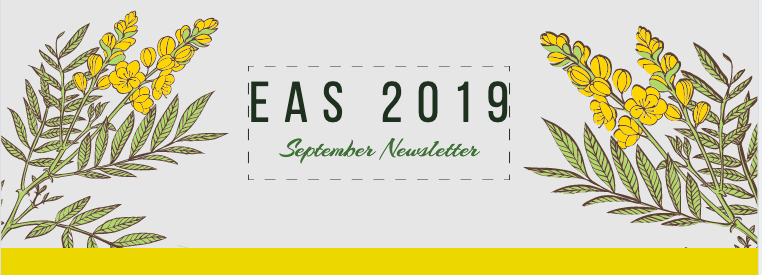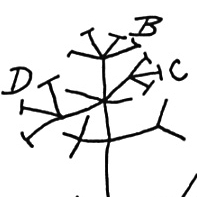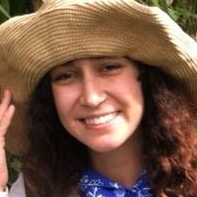EAS Quarterly Newsletter

Report from the Presidents
Dear EAS Members,
Welcome back for fall 2019!
We’d like to start by announcing the winners of the EAS Election: Karen Kramer of the University of Utah is our incoming President Elect. Alyssa Crittenden of UNLV and Jeremy Koster of the University of Cincinnati are our incoming Executive Board Members. Drew Gerkey of Oregon State University is our incoming Treasurer. Adam Reynolds of the University of New Mexico is our incoming Student Representative. Congratulations to all of our incoming officers, and many thanks to those who were willing to run for office!
As you all know, in the coming year we have a big decision to make about the future home of EAS. We have been meeting with the leadership of other organizations, and in October we expect to circulate information on these discussions to the EAS membership. This topic will be the focus of the EAS business meeting at the annual AAA meetings in Vancouver prior to a vote of the membership later this year.
We’re all looking forward to a great schedule of talks at the AAA meetings in Vancouver this October. The complete EAS schedule—along with a few relevant sessions sponsored by other sections—is listed below. We look forward to seeing many of you in Vancouver!
EAS Sessions
Thursday, November 21st
4:15 PM – 6:00 PM – Leadership, status and social change in biosocial perspective - East, Room 11
Friday, November 22nd
4:15 PM – 6:00 PM – Two Decades In: Changing Climate of Evolutionary Anthropology Research in the New Millennium - West, Room 214
Saturday, November 23rd
8:00 AM – 9:45 AM – Human Health and Reproduction in a Globalizing World: Biocultural Adaptation to Social and Ecological Change - East, Room 7
12:15 PM – 1:45 PM – Evolutionary Anthropology Society (EAS) Business Meeting - West, Room 119
2:00 PM – 3:45 PM – Behavioral ecology of social ties and social structure I: Reputations, kinship and other multiplex relations - West, Room 208
4:15 PM – 6:00 PM – Behavioral ecology of social ties and social structure II: Exchange, institutions and risk management - West, Room 208
Other Sessions of Interest
Thursday, November 21
8:00 AM – 9:45 AM – The “Ethno” in Ethnoprimatology: Evolving Methods in an Evolving Field - West, Room 220 (BAS)
10:15 AM – 12:00 PM – Growing up in times of stress: factors influencing the embodiment of struggle in childhood. - West, Room 101 & 102 (BAS)
4:15 PM – 6:00 PM – Geopolitical contexts (and conflicts) related to archaeological and bioanthropological knowledge production: the case of ancient DNA research from the North American region - West, Room 221 (BAS)
Friday, November 22
10:15 AM – 12:00 PM – Biological Normalcy: Investigating relationships between statistical norms and normative views - West, Room 112 (BAS)
4:15 PM – 6:00 PM – Bio-cultural Explorations of Stress, Caregiving, and Malnutrition in North and South America - West, Room 112 (BAS)
8:00 PM – 10:00 PM – Biological Anthropology Section Distinguished Lecture and Awards Ceremony - Pan Pacific Vancouver Hotel, Pacific Rim 1 (BAS)
Saturday, November 23
8:00 AM – 9:45 AM – Cultural Models, Cultural Knowledge, Consensus and Decisions - East, Room 11 (SAS)
10:15 AM – 12:00 PM – Changing climates in the study of sex and gender: new insights on old theories - West, Room 306 (SAS)
10:15 AM – 12:00 PM – The Legacy and Future of Cultural Consonance: William Dressler’s impact on cultural anthropology, theory, and methods - West, Room 214 (SAS)
Best wishes,
Mary Shenk, EAS President
Brooke Scelza, EAS President Elect
Recruitment
The Oklahoma Center for Evolutionary Analysis is recruiting PhD students: Multiple funded PhD positions for incoming graduate students in Experimental Psychology at Oklahoma State University.
A group of graduate students from WSU and Emory are brainstorming a late-breaking roundtable submission for the 2019 AAAs on the topic of reproductive rights as human rights with a focus on abortion in light of recent anti-abortion legislation passed in 6 U.S. states. They are looking for 1-2 other biocultural/evolutionary/medical anthropologists to participate. Discussion points will include evolutionary and biocultural perspectives on reproductive rights and the role of anthropology in activism. Please email klsyme@gmail.com if you’re interested in participating.
Emory University’s Department of Anthropology is hiring three biological anthropologists. More information can be found here.
The Culture, Behavior, Evolution and Development Lab (CuBED) in the Department of Psychology at Simon Fraser University is looking to recruit MA/PhD students. The position includes a SSHRC IDG grant-funded stipend of $12,000 for an MA student, or $15,000 for a PhD student already holding an MA degree, for two years. Funding requires the student to work on the SSHRD IDG-funded project. The student is expected to apply for additional fellowship funding to cover their fees, and/or work as a TA for additional funding through the completion of their degree.The graduate student will be based in the Department of Psychology and will be supervised by Dr. Michelle Kline. Please contact Dr. Kline (makline@sfu.ca) directly for interest in applying. Applicants must apply to the departmental program (Portal open: October 15 – December 1, 2019) in addition to discussing their application with Dr. Kline. Applicants should apply in Fall 2019 to begin the position in Fall 2020. Indigenous students and students from any historically underrepresented group are particularly encouraged to apply.
Recent Member Publications
Effects of Extreme Ritual Practice on Psychophysiological Well-Being By: Dimitris Xygalatas, Sammyh Khan, Martin Lang, Radek Kundt, Eva Kundtová-Klocová, Jan Krátký, and John Shaver
The Pregnancy Pickle: Evolved Immune Compensation Due to Pregnancy Underlies Sex Differences in Human Diseases By: Heini Natri, Angela R. Garcia, Kenneth H. Buetow, Benjamin C. Trumble, Melissa A. Wilson
Hybridization in human evolution: Insights from other organisms By: Ackermann et. al.
Pride and shame: Key components of a culturally universal status management By: Patrick K. Durkee, Aaron W. Lukaszewski, and David M. Buss
Gender-typed and gender-segregated play among Tanzanian Hadza and Congolese BaYaka hunter-gatherer children and adolescents By: Sheina Lew-Levy, Adam H. Boyette, Alyssa N. Crittenden, Barry S. Hewlett, Michael c
One piece of the matrilineal puzzle: the socioecology of maternal uncle investment By: Kathrine Starkweather and Monica Keith
The evolution of female-biased kinship in humans and other mammals By: Siobhán M. Mattison, Mary K. Shenk, Melissa Emery Thompson, Monique Borgerhoff Mulder and Laura Fortunato
Patterns of paternal investment predict cross-cultural variation in jealous response By: Brooke A. Scelza, Sean P. Prall, Tami Blumenfield, Alyssa N. Crittenden, Michael Gurven, Michelle Kline, Jeremy Koster, Geoff Kushnick, Siobhán M. Mattison, Elizabeth Pillsworth, Mary K. Shenk, Kathrine Starkweather, Jonathan Stieglitz, Chun-Yi Sum, Kyoko Yamaguchi & Richard McElreath
Development of social learning and play in BaYaka hunter-gatherers of Congo By: Gul Deniz Salali, Nikhil Chaudhary, Jairo Bouer, James Thompson, Lucio Vinicius & Andrea Bamberg Migliano
The expendable male hypothesis Opinion Piece by: Siobhán M. Mattison , Robert J. Quinlan and Darragh Hare
The dynamics of men’s cooperation and social status in a small-scale society By: Christopher R. von Rueden , Daniel Redhead , Rick O’Gorman , Hillard Kaplan and Michael Gurven
The evolution of intergroup tolerance in nonhuman primates and humans By: Anne Pisor and Martin Surbeck
Testing adaptive hypotheses of alloparenting in Agta foragers By: Abigail E. Page, Matthew G. Thomas, Daniel Smith, Mark Dyble, Sylvain Viguier, Nikhil Chaudhary, Gul Deniz Salali, James Thompson, Ruth Mace & Andrea B. Migliano
Periodic catastrophes over human evolutionary history are necessary to explain the forager population paradox By: Michael D. Gurven and Raziel J. Davison
Kinship ties across the lifespan in human communities By: Jeremy Koster, Dieter Lukas, David Nolin, Eleanor Power, Alexandra Alvergne, Ruth Mace, Cody T. Ross, Karen Kramer, Russell Greaves, Mark Caudell, Shane MacFarlan, Eric Schniter, Robert Quinlan, Siobhan Mattison, Adam Reynolds, Chun Yi-Sum and Eric Massengill
Cooperation beyond consanguinity: post-marital residence, delineations of kin and social support among South Indian Tamils By: Eleanor A. Power and Elspeth Read
The disequilibrium of double descent: changinghttps://evanthsoc.us15.list-manage.com/track/click?u=b66d0effc60d7e0f8e9508bd8&id=bba5d5b054&e=873ff7a1dd inheritance norms among Himba pastoralists By: Brooke A. Scelza, Sean P. Prall and Nancy E. Levine
How can non-human primates inform evolutionary perspectives on female-biased kinship in humans? By: Melissa Emery Thompson
When does matriliny fail? The frequencies and causes of transitions to and from matriliny estimated from a de novo coding of a cross-cultural sample By: Mary K. Shenk, Ryan O. Begley, David A. Nolin and Andrew Swiatek
Differences between sons and daughters in the intergenerational transmission of wealth By: Monique Borgerhoff Mulder, Mary C. Towner, Ryan Baldini, Bret A. Beheim, Samuel Bowles, Heidi Colleran, Michael Gurven, Karen L. Kramer, Siobhán M. Mattison, David A. Nolin, Brooke A. Scelza, Eric Schniter, Rebecca Sear, Mary K. Shenk, Eckart Voland and John Ziker
The evolution of infanticide by females in mammals By:Dieter Lukas and Elise Huchard
From matrimonial practices to genetic diversity in Southeast Asian populations: the signature of the matrilineal puzzle By: Goki Ly, Romain Laurent, Sophie Lafosse, Chou Monidarin, Gérard Diffloth, Frédéric Bourdier, Olivier Evrard, Bruno Toupance, Samuel Pavard and Raphaëlle Chaix
Other Media
Racism in science: the taint that lingers By: Robin Nelson
AnthroNews is making a Gossip Issue: they call for creative writing for their January/February Issue that is broadly defined as the topic of gossip from evolutionary perspectives on social grooming to linguistic tales. Deadline Oct. 31 2019, more information here.
Bioanth specific resources for addressing broader impacts in NSF here.
Coming Back From The Field Sausage of Science Episode with Agustin Fuentes
A Moonshot for Extraterrestrial Communication By: Luke J. Matthews
Grandmothers and Public Health By: Evolutionary Demography Group

